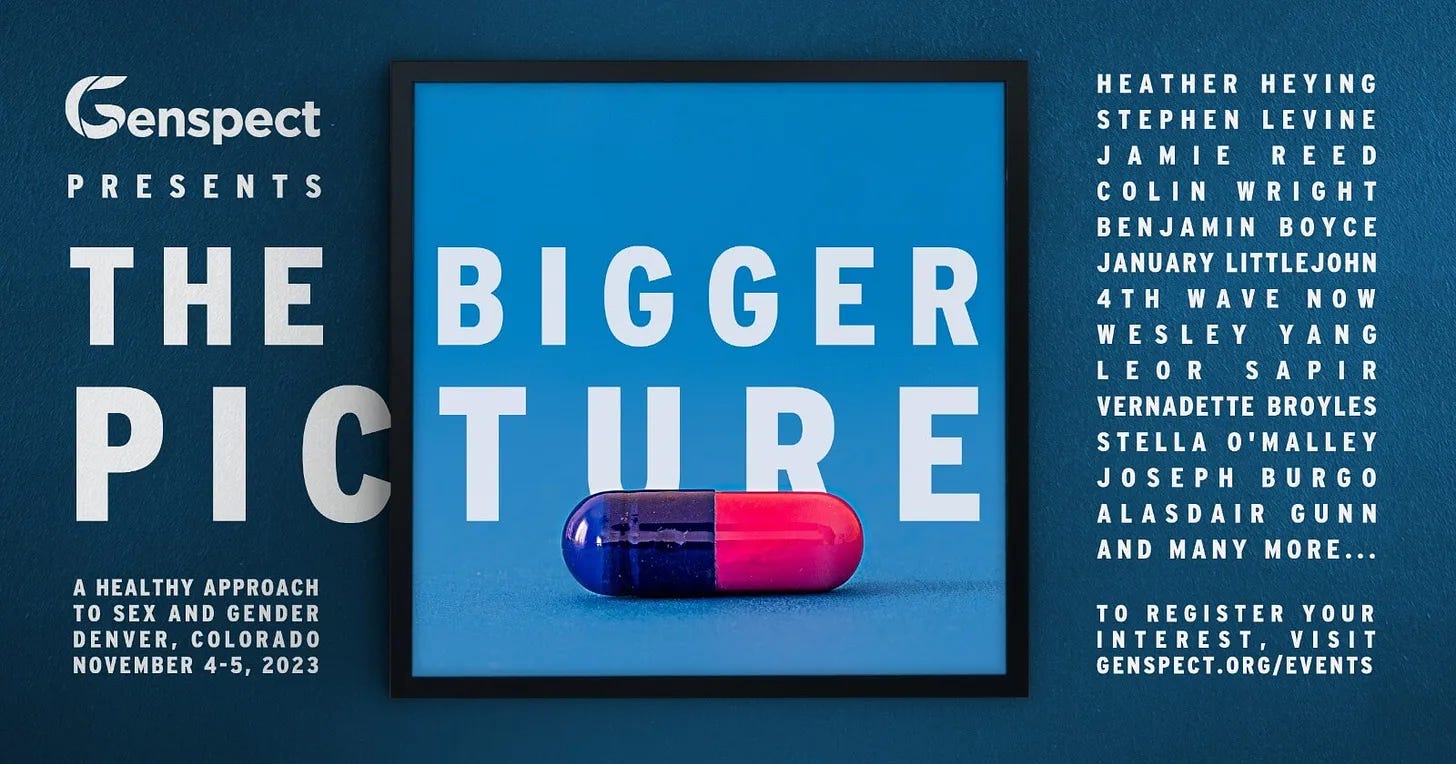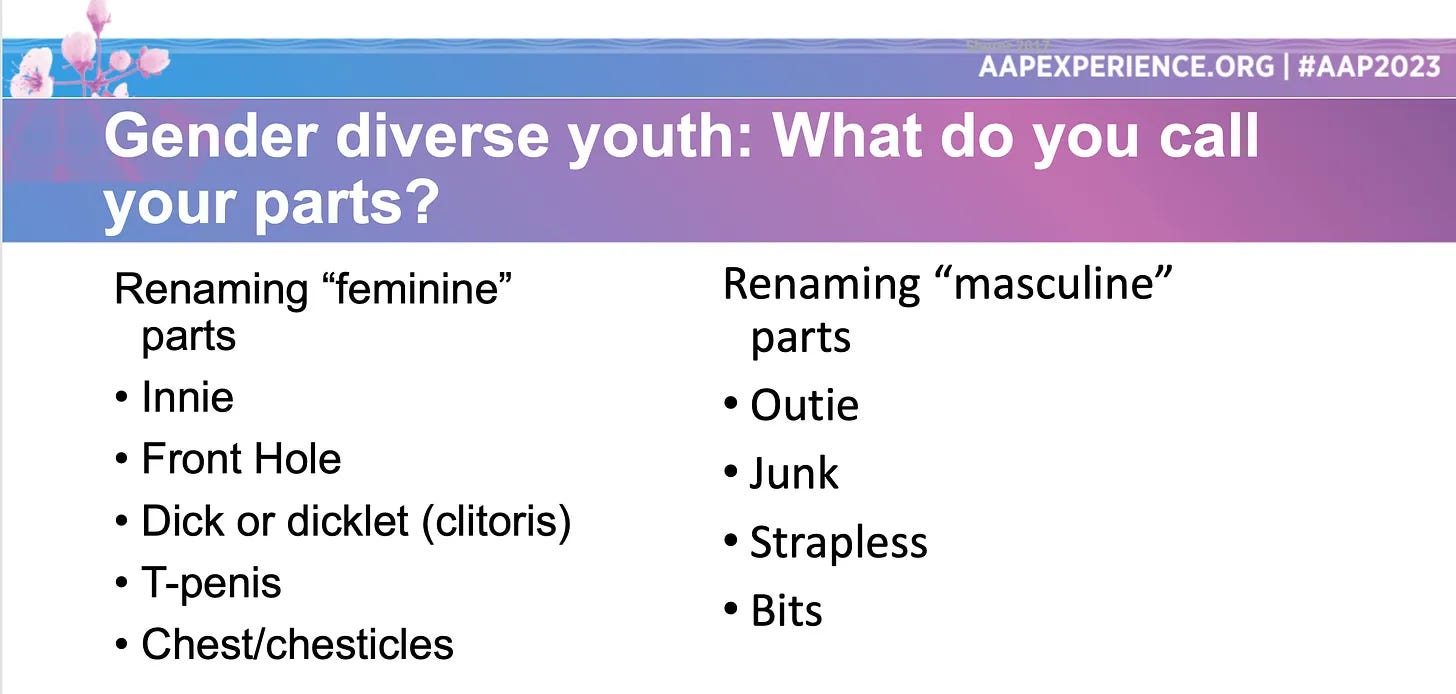The Evolution of Genspect
For FAIR’s Substack, Joseph Burgo writes about how Genspect is challenging gender medicine with a healthy approach to sex and gender.
Genspect envisions a world where people are free to present and express themselves in a manner that is healthy, safe and not constrained by gender stereotypes. We accommodate and respect, diversity of belief and freedom of expression, and we base our standards upon the principles of civilised debate, evidenced analysis, and human rights. Children experiencing gender related distress deserve high-quality, evidence-based care, and Genspect is actively working to make that a reality.
[Mis]Adventures at the AAP Conference
For her Substack BROADview, FAIR Advisor Lisa Selin Davis writes about her experience manning the FAIR in Medicine booth at the American Academy of Pediatrics’ annual conference.
The response from many people: Sounds reasonable. How, then, I’d ask, could clinicians bring this up with colleagues or ask for more guidance? Stumped again, because the most common response we got from concerned clinicians was that they were afraid to broach the subject with colleagues or administrators. We need to create an environment in which this topic can be discussed, and help people figure out how to do that. That’s beyond my ken as a journalist covering this topic.
The most angry and defensive people we encountered, besides one journalist and one young adult who’d just begun transitioning and who flipped us the bird on the way up the escalator, were parents of trans kids. Aside from the concerned doctor father of that angry young transitioning man, they refused to look at any materials, responding with “I already know all that, I already know.” They were sure they knew what we had to say, sure they’d been fully informed, sure that anyone who wanted to talk was a bigot and a transphobe and nothing more. One mom of a happily transitioned 23-year-old yelled that we shouldn’t be there and shouldn’t parade detransitioners around—not realizing that they came willingly, wanting to share their stories in the hopes that there will someday be fewer such stories to tell.
Misinformation is everywhere during war—here’s how to stop it
For NewsNation, FAIR Advisor Zaid Jilani writes about how to avoid misinformation during times of war.
NewsNation spoke to two specialists on the topic — Hannah Covington, the director of education design at the News Literacy Project, and Colleen Sinclair, a Louisiana State University-based researcher who studies misinformation in the context of violence — who offered practical advice.
In the era of smartphones, much of what we consume is not from a newspaper or television screen but from viral content that pops up on our social media apps.
“The first thing we tell people is just number one, remember that misinformation does thrive during breaking news events, including wars, and we absolutely have to be cautious about what we share. Just because something has [a] huge amount of views or likes does not mean it’s credible,” Covington said.
Sinclair said that some of the content being shared on the internet may even be the work of foreign actors trying to sow division.
Let the Activists Have Their Loathsome Rallies
For The Atlantic, Thomas Chatterton Williams writes about why he is grateful to call home a country where, despite illiberal criticism of open debate, freedom of expression still prevails.
Even as I’m angered by the spectacle of activists and students praising homicidal actors from afar, I’m grateful for America’s comparatively extreme free-speech norms, its formal and informal commitment first of all to personal liberty. This culture of free exchange is a privilege we take for granted at our own peril. This is what the leaders of the ACLU understood when they defended the right of neo-Nazis to march through the largely Jewish town of Skokie, Illinois, in the late 1970s. And it is a core commitment too many have been willing to sacrifice in the feelings-first debates around cancel culture.
The rise of the underground free speech groups
For The Spectator, Melanie Notkin writes about how independent thought is making a comeback in progressive cities.
A vibe change is coming. Friends in New York are now pushing back on topics like gender ideology and identity politics. My dates are pleasantly surprised to meet a woman who subscribes to the same Substacks and podcasts as they do. I’ve been engaged in this space since 2015 when a friend invited me to a private Facebook group, a Viennese-style salon, where members participate in open discussions around social, cultural and political issues, without fear of being attacked for their opinions. There, you’re free to say things you cannot say without being called, for example, “tacitly alt-right” for a pro-free speech stance for all.
FAIR News Podcast
For audio versions of our FAIR News and FAIR Weekly Roundup newsletters, subscribe and listen to FAIR News Weekly on Apple Podcasts, Spotify, Google Podcasts, or via RSS feed.
Join the FAIR Community
Join us, and become a member of FAIR.
Become a FAIR volunteer, or join a FAIR chapter.
Take the Pro-Human Pledge and help promote a common culture based on fairness, understanding, and humanity.
Sign-up for a Welcome to FAIR Zoom information session to learn more about our mission.
Share your reviews and incident reports on our FAIR Transparency website.










